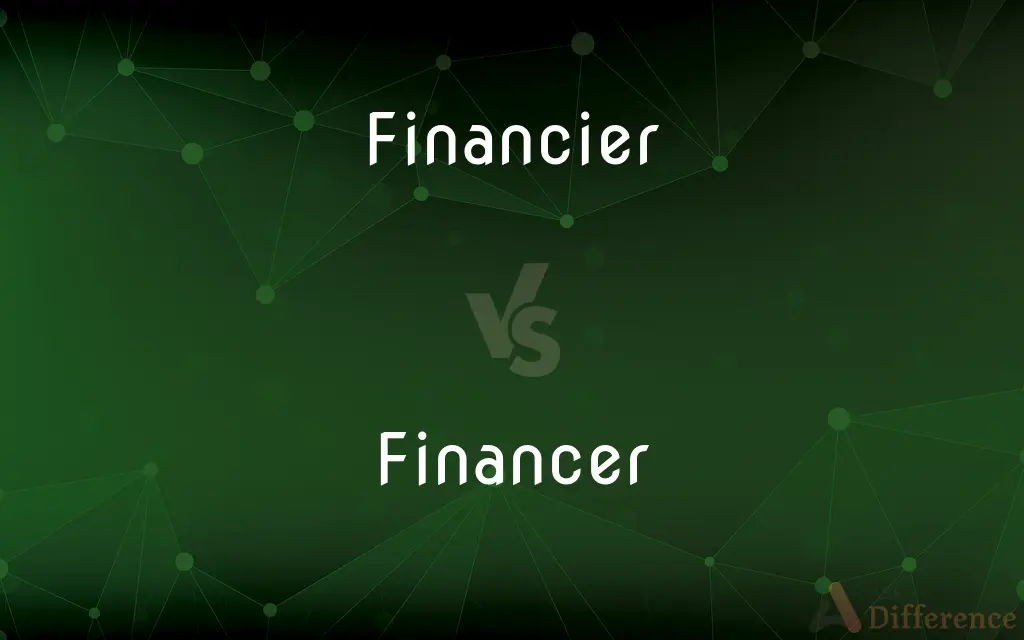Financier vs. Financer — What's the Difference?
By Maham Liaqat & Urooj Arif — Updated on March 4, 2024
A financier is someone who invests in businesses or projects expecting a return, while a financer provides funding without necessarily investing.

Difference Between Financier and Financer
Table of Contents
ADVERTISEMENT
Key Differences
A financier typically refers to an individual or institution that invests in businesses, projects, or real estate, often with the expectation of achieving a return on their investment. They might use their own funds or leverage financial instruments to increase their investment capacity. On the other hand, a financer is a broader term that can include banks, lending institutions, or individuals providing funds for various purposes, not always with the expectation of direct profit from the ventures they finance.
Financiers are often involved in the strategic aspects of the investments, sometimes participating in management or decision-making processes to safeguard their interests and ensure the success of their investments. Whereas financers, especially when referring to lenders, might not engage in the management of the projects or businesses they fund, as their primary concern is the repayment of the loan with interest.
The role of a financier is closely associated with investment management and venture capital, where the emphasis is on growing capital through strategic investments. In contrast, financers might operate within the realms of loans, credit, and mortgages, focusing on the provision of funds with the expectation of their return rather than seeking equity or profit sharing.
Risk assessment is a critical component for both financiers and financers, but their approaches can differ. Financiers may accept higher risks for the potential of greater returns, especially in venture capital or equity investments. Financers, particularly lenders, typically seek to minimize risk through collateral or credit assessments, aiming for secure returns rather than speculative gains.
Understanding the distinction between the two can help businesses and individuals navigate financial partnerships and agreements, ensuring they align with the right type of financial support for their needs. Whether seeking investment for growth or funding for specific projects, recognizing the differences in expectations, risk tolerance, and involvement can lead to more informed and beneficial financial decisions.
ADVERTISEMENT
Comparison Chart
Definition
An investor looking for returns on investment
A provider of funds for various needs
Expectation
Profit from investments
Repayment of loans with interest
Involvement
May participate in management
Primarily concerned with financial return
Risk Tolerance
Higher, with potential for greater returns
Lower, seeks secure returns
Focus Area
Strategic investments (venture capital, equity)
Loans, credit, mortgages
Compare with Definitions
Financier
Seeks strategic investment opportunities.
The financier focused on high-growth tech companies.
Financer
Provides funding or capital for various purposes.
The bank acted as a financer for the construction project.
Financier
Participates in venture capital.
She became a prominent financier in the biotech sector.
Financer
May not seek direct investment returns.
The financer provided a loan with the expectation of repayment plus interest.
Financier
May use various financial instruments.
The financier leveraged private equity to maximize returns.
Financer
Operates in mortgages and lending.
The institution became a leading financer in the housing market.
Financier
An investor in businesses or projects for potential returns.
The financier invested in the startup, hoping for it to thrive.
Financer
Focuses on loans and credit provision.
As a financer, their primary concern was the borrower's creditworthiness.
Financier
Often involved in decision-making processes.
As a financier, he provided both capital and strategic advice.
Financer
Engages in risk assessment for loan security.
The financer required collateral to secure the loan.
Financier
A person concerned in the management of large amounts of money on behalf of governments or other large organizations.
Financer
(finance) An entity that provides financing
Financier
One that engages in investing or raising large amounts of money.
Financier
A person who, as a profession, profits from large financial transactions.
Financier
One charged with the administration of finance; an officer who administers the public revenue; a treasurer.
Financier
One skilled in financial operations; one acquainted with money matters.
Financier
A person skilled in large scale financial transactions
Common Curiosities
Can a bank be considered a financier?
While banks can act as financiers, they are typically considered financers, providing loans and credit rather than investing directly in ventures for equity.
What distinguishes a financier from a financer?
A financier invests with the expectation of a return, often involving in strategic aspects, whereas a financer provides funds, focusing on repayment and interest.
What type of financial support does a financer offer?
Financers offer various types of financial support, including loans, mortgages, and credit facilities, focusing on the provision of funds.
Do financiers get involved in management?
Yes, financiers may get involved in management or decision-making to protect their investment and ensure its success.
What is the main goal of a financer?
The main goal of a financer is to provide funding with the expectation of its return, along with interest, focusing on financial returns rather than direct involvement in investments.
Is risk tolerance higher for financiers or financers?
Financiers often have a higher risk tolerance, seeking substantial returns through strategic investments, unlike financers who prioritize loan security.
What are the advantages of working with a financer?
Working with a financer offers structured financial support with clear terms, providing stability and predictability for financial planning.
How do financiers assess investment opportunities?
Financiers assess opportunities based on potential returns, strategic value, and risk, often using their expertise to select high-growth ventures.
How do financiers contribute to business growth?
Financiers contribute by providing capital, strategic advice, and sometimes by leveraging their networks to support business expansion and success.
Can individuals be considered financiers?
Yes, individuals with the capital and interest in investing for profit can be considered financiers.
What is the role of a financer in a project?
A financer's role is to provide the necessary funds for the project, focusing on the financial aspect rather than the project's operational or strategic management.
What makes someone choose a financier over a financer?
The choice depends on the need for strategic investment and potential for growth (financier) versus the need for a loan or credit with defined repayment terms (financer).
Can a financer become a financier?
Yes, a financer can become a financier if they start investing directly in companies or projects with the intention of gaining returns on their investments, beyond just providing loans.
Are venture capitalists considered financiers?
Yes, venture capitalists are a specific type of financier that invests in startups and high-growth companies, often taking an active role in their development.
How do financiers and financers manage risk?
Financiers manage risk by diversifying investments and engaging in ventures with high growth potential, while financers minimize risk through collateral and credit assessments.
Share Your Discovery

Previous Comparison
Dedication vs. Determination
Next Comparison
Pollyannish vs. QuixoticAuthor Spotlight
Written by
Maham LiaqatCo-written by
Urooj ArifUrooj is a skilled content writer at Ask Difference, known for her exceptional ability to simplify complex topics into engaging and informative content. With a passion for research and a flair for clear, concise writing, she consistently delivers articles that resonate with our diverse audience.














































